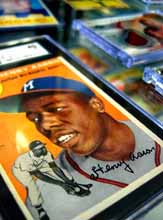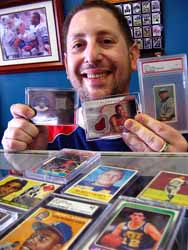Selling sports memories
“Between 1989 and 1993, these shops were as common as gas stations.”
Those are the words of Rick Fein, owner of Rick’s Cards and Collectables. Fein has been collecting sports memorabilia for over thirty years and has owned his own store for about nine months now.
Needless to say, he has quite the collection.
Unfortunately for many private owners, mass commercialization in the last fifteen years has made it more difficult to succeed in the business. Once bigger businesses got involved, small sports shops don’t bring in the money they used to.
Card companies like Topps and Hoops have gone from selling a regular pack of cards for 50 cents to charging around two dollars for cards with special features. These features include authentic autographs, jersey numbers, reflectors, and even material from the player’s jersey. Ordinary cards that were bought 30 years ago have taken a back seat.
Autographs are 10 to 20 times more valuable when they appear on one of these cards than when they are obtained firsthand, as is the case with many private shops.
Fein says this is because 75 percent of all autographs are forgeries. With all this in mind, private owners who used to sell older, simpler memorabilia have just starrted to “catch up” with the big companies, so to speak, and are on the rise again.
Contrast all that with the major sports shop chains, particularly Pro Image.
Kris Katseanes, the manager at Pro Image in the Cache Valley Mall, says that business has been “unbelievable” in the last three or four years.
Specializing in the sales of sports apparel, Pro Image has been able to meet the demands that have been brought about by commercialization in the sports world. According to Katseanes, the best selling items at Pro Image have been throwback jerseys, jerseys worn by winning teams, and jerseys that have been worn by celebrities, particularly rappers.
Katseanes also says that the most popular items are those of athletes who are currently under public scrutiny. Kobe Bryant jerseys, for example, have become more valuable since his trial began. Katseanes believes the value will increase even more if Bryant goes to jail.
Fein, who sells collectables as opposed to apparel, has had a different experience with that.
“Players are getting in trouble, demanding unheard of amounts of money. It drives people away,” he said.
Fein says there are lots of people who haven’t gone back to watching baseball since the players strike ten years ago. He believes that is part of the reason why setting up private sports shops isn’t as profitable as it used to be. Private collectors sell what they have accumulated over the years, while the big companies sell whatever is in demand.
So which items are the most profitable these days? Fein and Katseanes agree that athletes in the public eye sell the most. The hot items often depend on the season, so right now, basketball is the hot commodity, specifically Lebron James, John Stockton, and Karl Malone items. Fein says he did not expect Malone’s popularity to actually go up, at least not with most Utahns. Surprisingly, Malone items have increased in value since he joined the Lakers.
A one of a kind Lebron James card recently sold for $13,000, while the 500 cards that Stockton signed throughout his entire career each sold for $500.
It doesn’t end with cards and jerseys though. Some of the most unusual items that have been sold on this market include gum that was chewed by the Arizona Diamondbacks’ Luis Gonzalez ($3700), an error card that had just the border on it ($25), and the baseball that Chicago Cub fan Steve Bartman ‘interfered’ with during the 2003 National League playoffs ($106 thousand). Incidentally, the man who bought the Bartman
baseball burned it.
Also, Mickey Mantle’s estate has sold such items as his passport, credit cards, and strands of his hair.
But while sports memorabilia of all kinds remain in demand, Fein and Katseanes agree that sports shops, both big and small, are going to have a tougher time in the future than they did in the past. The Internet, E-Bay, and auctions make it more difficult to get people to come in and buy sports memorabilia.
According to Katseanes, the simple things like cards and baseballs are so common, they’re “no big deal anymore.”
Says Fein, “We’ll never get back to where we used to be.”
-mattandersen@cc.usu.edu

A Henry Aaron baseball card is one of many memorabilia items displayed at Rick´s Cards and Collectables in Logan. (Photo by Scott Davis)

Rick Fein, owner of Rick´s Cards and collectables, shows some of the most valuable and interesting cards he currently has for sale (Photo by Scott Davis)

